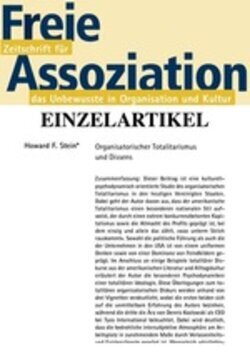26 Seiten, PDF-E-Book
Erschienen: November 2007
Bestell-Nr.: 21085
abonnieren
Howard F. Stein
Organisatorischer Totalitarismus und Dissens (PDF)
Freie Assoziation 2007, 10(3), 29-54
Sofortdownload
Dies ist ein E-Book. Unsere E-Books sind mit einem personalisierten Wasserzeichen versehen,
jedoch frei von weiteren technischen Schutzmaßnahmen (»DRM«).
Erfahren Sie hier mehr zu den Datei-Formaten.
Eine kulturell-psychodynamisch orientierte Studie des organisatorischen Totalitarismus in den heutigen Vereinigten Staaten wird vorgelgt. Dabei wird davon ausgegangen, dass der amerikanische Totalitarismus einen besonderen nationalen Stil aufweist, der durch einen extrem konkurrenzbetonten Kapitalismus sowie die Allmacht des Profits geprägt ist. Sowohl die politische Führung als auch die der Unternehmen in den USA ist von einem uniformen Denken sowie von einer Dominanz von Feindbildern geprägt. Im Anschluss an einige Beispiele totalitärer Diskurse aus der amerikanischen Literatur und Alltagskultur werden die besonderen Psychodynamiken einer totalitären Ideologie erläutert. Diese Überlegungen zum totalitären organisatorischen Diskurs werden anhand von drei Vignetten verdeutlicht, wobei die ersten beiden sich auf die unmittelbare Erfahrung des Autors beziehen, während die dritte die Ära von Dennis Kozlowski als CEO (Chief Executive Officer) bei Tyco International beleuchtet. Dabei wird deutlich, dass die bedrohliche intersubjektive Atmosphäre am Arbeitsplatz in zunehmendem Maße durch Verlassenheits- und Existenzängste geprägt ist. Wenngleich »whistleblowers« einen gesetzlichen Schutz genießen, so bietet dies doch denen nur wenig Trost, die für sich selbst keine andere Möglichkeit sehen, als die totalitären Tendenzen eher schweigend über sich ergehen zu lassen und sich auf die bloße Erfüllung ihrer Aufgaben zurückzuziehen.
Abstract:
This paper undertakes a psychodynamicallyinformed cultural study of organizational totalitarianism in the contemporary United States. It proposes a distinctive national style to totalitarianism, one bound up with unbridled competitive capitalism and the sanctity of »the bottom line« as the highest and only good. The process of lockstep-thinking and enemy-making inhabits and dominates American organizational as well as political leadership. After presenting examples of totalitarian discourse in American literature and popular culture, the paper discusses the psychodynamics of totalitarian ideology. The paper then presents three vignettes of totalitarian organizational discourse, the first two from local perspectives, and the third, an examination of the era of Dennis Kozlowski at Tyco International. The menacing intersubjective atmosphere of the workplace becomes a breeding ground for abandonment and annihilation anxiety. Under these circumstances, the official and legal protection offered to »whistleblowers« offers little comfort to those who now silence themselves and turn inward to performing their tasks.
Stichworte: Totalitarismus, Organisationen, Organisationsklima, Ideologie, Kapitalismus, Wettbewerb, Psychodynamik, Informanten (Strafverfolgung)
Keywords: Totalitarianism, Organizations, Organizational Climate, Ideology, Capitalism, Competition, Psychodynamics, Informants
Abstract:
This paper undertakes a psychodynamicallyinformed cultural study of organizational totalitarianism in the contemporary United States. It proposes a distinctive national style to totalitarianism, one bound up with unbridled competitive capitalism and the sanctity of »the bottom line« as the highest and only good. The process of lockstep-thinking and enemy-making inhabits and dominates American organizational as well as political leadership. After presenting examples of totalitarian discourse in American literature and popular culture, the paper discusses the psychodynamics of totalitarian ideology. The paper then presents three vignettes of totalitarian organizational discourse, the first two from local perspectives, and the third, an examination of the era of Dennis Kozlowski at Tyco International. The menacing intersubjective atmosphere of the workplace becomes a breeding ground for abandonment and annihilation anxiety. Under these circumstances, the official and legal protection offered to »whistleblowers« offers little comfort to those who now silence themselves and turn inward to performing their tasks.
Stichworte: Totalitarismus, Organisationen, Organisationsklima, Ideologie, Kapitalismus, Wettbewerb, Psychodynamik, Informanten (Strafverfolgung)
Keywords: Totalitarianism, Organizations, Organizational Climate, Ideology, Capitalism, Competition, Psychodynamics, Informants
Rose Redding MerskyS. 7–27Lost in Transition: Eine psychoanalytische Untersuchung zur Objektbindung in heutigen post-modernen Organisationen (PDF)
Freie Assoziation 2007, 10(3), 7-27Howard F. SteinS. 29–54Organisatorischer Totalitarismus und Dissens (PDF)
Freie Assoziation 2007, 10(3), 29-54Haralan Alexandrov & Rafael Chichek S. 55–73Pathologische Folgen missbrauchten Sozialismus (PDF)
Freie Assoziation 2007, 10(3), 55-73Lothar MalkwitzS. 75–87Führung, Verführung und Todesangst - Eine theologische-psychoanalytische Etüde zu R.W. Bion (PDF)
Freie Assoziation 2007, 10(3), 75-87Rupert MartinS. 89–102Good Bye, Lenin! (PDF)
Freie Assoziation 2007, 10(3), 89-102Tomas PlänkersS. 103–114Der erste Kaiser und der letzte Parteichef. Der Film »Hero« (Zhang Yimou 2002) und seine gegenwärtige Bedeutung im innerchinesischen Diskurs (PDF)
Freie Assoziation 2007, 10(3), 103-114
Freie Assoziation 2007, 10(3), 7-27Howard F. SteinS. 29–54Organisatorischer Totalitarismus und Dissens (PDF)
Freie Assoziation 2007, 10(3), 29-54Haralan Alexandrov & Rafael Chichek S. 55–73Pathologische Folgen missbrauchten Sozialismus (PDF)
Freie Assoziation 2007, 10(3), 55-73Lothar MalkwitzS. 75–87Führung, Verführung und Todesangst - Eine theologische-psychoanalytische Etüde zu R.W. Bion (PDF)
Freie Assoziation 2007, 10(3), 75-87Rupert MartinS. 89–102Good Bye, Lenin! (PDF)
Freie Assoziation 2007, 10(3), 89-102Tomas PlänkersS. 103–114Der erste Kaiser und der letzte Parteichef. Der Film »Hero« (Zhang Yimou 2002) und seine gegenwärtige Bedeutung im innerchinesischen Diskurs (PDF)
Freie Assoziation 2007, 10(3), 103-114

